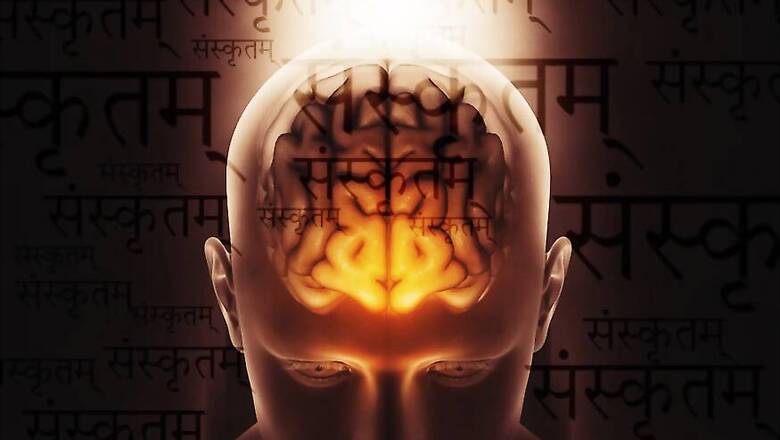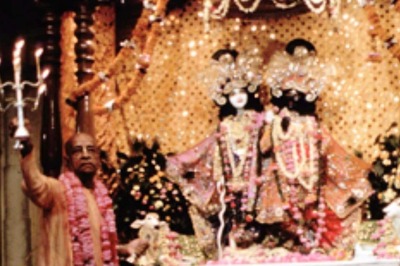
views
Is Sanskrit special? Neuroscientist James Hartzell’s study on “Sanskrit Effect,” reported in the journal, Scientific American, claims that memorising Vedic mantras enhances the brain regions associated with cognitive functions such as memory.
What he finds interesting about Sanskrit is “the discussion within the tradition about enhancing (even psychophysical) effect of using the language,” he said responding to News18.com’s email.
Hartzell has studied Sanskrit and Tibetan at Harvard and Columbia Universities and Cognitive Neuroscience at the University of Trento.
His Stint with Sanskrit and the Project
Hartzell’s report was tested when he and his colleagues from the University of Trento in Italy collaborated with Dr Tanmay Nath and Dr Nandini Chatterjee Singh of the National Brain Research Centre (NBRC) at Manesar in Haryana. Their study was focused on 42 volunteers — 21 professionally qualified Sanskrit Pandits reciting the Shukla Yajurveda. The project was funded by the India-Trento Partnership for Advanced Research, a program between India's Department of Science and Technology (DST) and Italy's province of Trentino and University of Trento.
With the help of Indian government, he was able to recruit the professionally qualified and trained Yajurveda Pandits for the study. Hartzell visited Maharshi Sandeepani Rashtriya Veda Vidya Pratishthan and was treated to demonstration recitations. He attended a Vedic recitation festival in Ujjain and also visited the All India Elocution Contest in Bangalore in 2012, where the top students from Sanskrit colleges around the country compete in the golden stick test in a wide range of Sanskrit subjects (not just Vedas). It took a couple of years to set the study up.
Once they set everything up (establishing all the agreements, mutual understandings, funding, recruitment plans, experimental design, scanning plans, etc.) the actual MRI scanning time involved was over several months. “The analysis part of the study and writing up of the paper took many months --- as is common for PhD projects where the PhD student is learning new analysis methods,” he said. In all these events, and some others, he was deeply impressed “by the ability of Sanskrit Pandits to recite, exactly from memory, complex Sanskrit texts, and to explain them in Sanskrit,” he said.
However, this project was not without challenges: “Right from gaining approval through the various administrative and government organisations involved in both India and Italy to cultural challenges in introducing the idea of the study to senior officials of the government's Vedic organisation and then communicating the specifics to the participants recruited from the Pandit schools,” said Hartzell. Tanmay Nath played a key role in the project's success. The other challenges were logistical (bringing all the Pandits to NBRC for scanning) and getting the scanning completed on time, and all the normal challenges of complex neuroimaging data analysis and publication.
Sanskrit effect?
For him, Sanskrit Effect is to be “able to think clearly”. He explained it using a metaphor; although, he called it “inadequate”. “Moving into thinking in Sanskrit when translating from Sanskrit (rather than thinking primarily in my native English) brings with it a profound shift in cognitive experience that might be compared to something such as (and here is the metaphorical aspect) moving from walking in the air, to swimming in water while still breathing air.”
This, Hartzell said, “Is quite different and I find that my mental experience is more fluid. There's a certain quality to the cognitive experience that is a bit difficult to describe in English. Though there are many aspects to it and these are described in some of the Sanskrit texts themselves.”
Further, the neuroscientist explained that when he moves back into English afterwards, he tends to think a bit more clearly about other things. “So it has some similarities to swimming for exercise in this sense---afterwards one feels healthier and livelier and can think more clearly,” he said.
The language unchanged
Throughout the interaction, Hartzell maintained that there needs to be more scientific research in finding out the special effect that Sanskrit has on the mind. So what exactly does he find interesting about the language? “We still have a very good idea of the correct pronunciation of the words dating back over 3000 years, thanks to the many lineages of exact memorisation and recitation of Sanskrit texts (not just the Vedas themselves),” he said.
From what he understands, this may make “Sanskrit unique among the world’s languages.” Because, like Hartzell explains, typically the pronunciation of an old language changes quite considerably over the centuries.
“Both English and modern Tibetan, for instance, have many words with letters that are no longer pronounced,” he said. Providing an example, he said: “While the actual word in English is “through”, but it is pronounced “thru”.”
“Sanskrit's preservation of pronunciation over the many centuries provides a very interesting sort of phonemic time capsule,” he said.
Hartzell has years of experience in translation and, therefore, quite an in-depth knowledge of some aspects of the Sanskrit tradition. He became curious to find out whether there might be some way to scientifically investigate and understand the basis of the Sanskrit effect. “Why was it that the experience of working deeply in the language (as one must do in order to translate Sanskrit texts) seemed to have such a profound effect on how my mind functioned? So when the chance arose to pursue this question more deeply, I was really pleased and inspired and have worked very hard on it.”
Way forward
Well-known Indian biophysical chemist Dorairajan Balasubramanian, former president of Indian Academy of Sciences, claimed in a newspaper article that studies have been conducted earlier to show that Christian monks who chanted the Gregorian Chants have an exceptional memory too. Further, he wrote, that it need not be verbal or religious chanting at all. It could be visual and spatial training too.
While Hartzell supports further research in science to prove his claims, he feels Sanskrit is particularly unique.



















Comments
0 comment